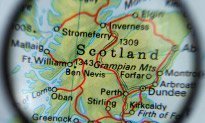Scots NHS register sharing plans slammed
- 25 February 2015

The Scottish government is facing criticism over plans to share information held in an NHS database with other public bodies, with privacy campaigners claiming it amounts to creating a national identity card without the card.
The SNP government proposed earlier this month that the HMRC should be able to use non-medical information from the NHS central register to keep track of taxpayers in Scotland.
This would happen from April 2016, when the country is set to implement its own rate of income tax separate from the rest of the UK.
The data available to the HMRC – and other public organisations – would include general details such as names, dates of birth, postcodes and gender.
A consultation period is set to close today and the plans have attracted fierce opposition from critics, including campaign groups Liberty, NO2ID and Open Rights Group, as well as several politicians.
Among the more prominent opponents is Labour MP for Glasgow East and shadow Scottish secretary of state Margaret Curran, who told STV the government needs to “ditch these proposals.”
"This risks breaking down the trust that exists between patients and Scotland's NHS. The SNP should not be handing our NHS data to the tax man,” said Curran.
The Green Party has also challenged the plans, with MSP Patrick Harvie using a parliamentary meeting on 19 February to ask deputy first minister John Swinney about the government’s position on privacy concerns.
Responding to the question Swinney said: “The measures on which we are consulting will improve the accuracy of key statistics on Scotland’s population and on migration.
“[It will] ensure that public sector organisations can verify whom they are dealing with in order to deliver the right services to people; support the tracing of missing persons; ensure that individuals who wish to do so can securely access online public services through the myaccount initiative; and accurately identify Scottish taxpayers.”
Digital rights organisation Open Rights Group is one of the leading campaign groups to oppose the government’s plans, which it says equates to the creation of a national identity database.
In a recent blog post, the group highlighted the possibility of the NHS data being shared with 120 public bodies, ranging from Glasgow Airport to the Royal Botanical Gardens.
“This is the key point,” said the blog. “It is more or less impossible to see this database as anything less than a national, Scottish Identity Database.”
BMA Scotland has also expressed concern. A spokesperson told EHI News: “The confidentiality of medical records, and the trust this engenders, is a cornerstone of the doctor-patient relationship.
“Sharing confidential health information with the government for the identification of income tax payers would seriously undermine this trust with the result that patients may feel reluctant to seek medical help from their doctor.
“Given that there is such a strong public interest in maintaining patients’ trust in a confidential health service, the Scottish government must consider other means, outside of the health service, to identify tax payers.”
Similarly, Dr Miles Mack, chair of the Royal College of General Practitioners (Scotland), said: “Patient care is the core concern of the NHS in Scotland. That and that alone is its purpose. Any measures which could potentially compromise that care should not be implemented.
“RCGP Scotland cannot accept the proposal that GPs, or the other health professionals GPs refer patients to, should be used as information collection services for government. The only use for any information collected should be towards the medical care of the patient.”
Responding to this criticism the government played down fears that the plans to share NHS data were a cause for concern. "There are no proposals to share medical records and any suggestion of that is simply wrong,” said a spokesperson. “Identification of Scottish taxpayers and administering the tax are matters for the UK government and HMRC.”
The NHS central register contains basic demographic details of everyone who was born in Scotland or is registered with a GP in the country.
The main purpose of the register is to allow the smooth transfer of patients who move between different areas of Scotland or to another country within the UK.




